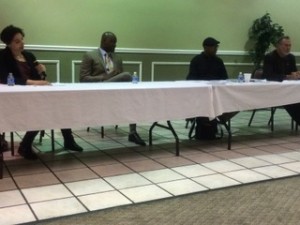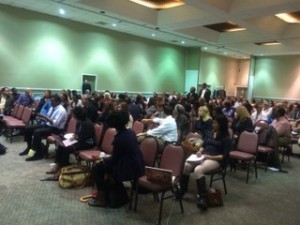An in-depth discussion about housing trends in D.C. was hosted by Elevation DC Magazine, Oct. 21.

Rebecca Sheir, moderator and panelists Buwa Binitie, Dominic Mouldon and Bernard Demczuk.
The conversation was an effort to explore the line between preserving affordable housing for long-time District residents and making way for newcomers to enjoy living in the city as well, said David Bowers, VP and market leader at Mid-Atlantic and representative from Enterprise Community Partners, who sponsored the event.
The panel discussion, “Gentrification, Revitalization or Renaissance,” was moderated by Rebecca Sheir, host of WAMU’s Metro Connection and took place at Shiloh Baptist Church in the Shaw neighborhood in Northwest.
The “G word” or gentrification can be a touchy subject, according to panelist Dr. Bernard Demczuk, George Washington University’s assistant vice president for D.C. government relations, African American history teacher at School Without Walls and Ben’s Chili Bowl historian. He said he prefers not to use the term at all.
He argued that word’s associated with the displacement of low-income residents by more upwardly mobile individuals is inaccurate. Instead, the cause is a reflection of the third great wave of American cities.
“It has to do with the natural flow of economics and demographic shifts,” he said. “And ain’t nothing going to stop it.”

Long-time District residents and newcomers attended the discussion.
Conversely, Dominic Mouldon, representing non-profit ONE DC, views gentrification as an injustice against people of African descent.
“D.C. claims to be a human rights city,” he said. “The crime is the erasing of civil and human rights for D.C. citizens — the erasing of history, culture and art of long time D.C. residents.”
Whether a natural shift in urban cities or an intentional disregard by local government, District residents are ultimately interested in solutions.
ONE DC’s programming is centered around popular education, community organizing, and alternative economic development projects. The organization’s citywide initiative, “The People’s Platform,” addresses community control over land use, equitable development without displacement, permanent housing affordability and community and family wealth creation.
As someone who builds housing, panelist Buwa Binitie said he believes the issues lies in barriers for residential providers.
“As the District flourishes, the issue, as a housing provider, is that we cannot build fast enough,” he said.
Binitie is the managing principal at developer Dantes Partners located in Northwest D.C. The company sites disorganized city regulations as a significant hold up in creating adequate housing units in the city.
According to Demczuk, steps to addressing the housing issue must be a combined effort by residents and policy makers.
An advocacy process from communities should be inclusive of developers, communities should not see them as the enemy, he said. Further, communities must begin to actively vote and build political power.
Demczuk said that the District should put more funding into the housing budget, totaling $1 billion over the next four years. The government can also voluntarily tax the rich, he continued.
Demczuk also said an effective communications campaign must be built around the issue and in a timely manner, considering the upcoming Mayoral election.

